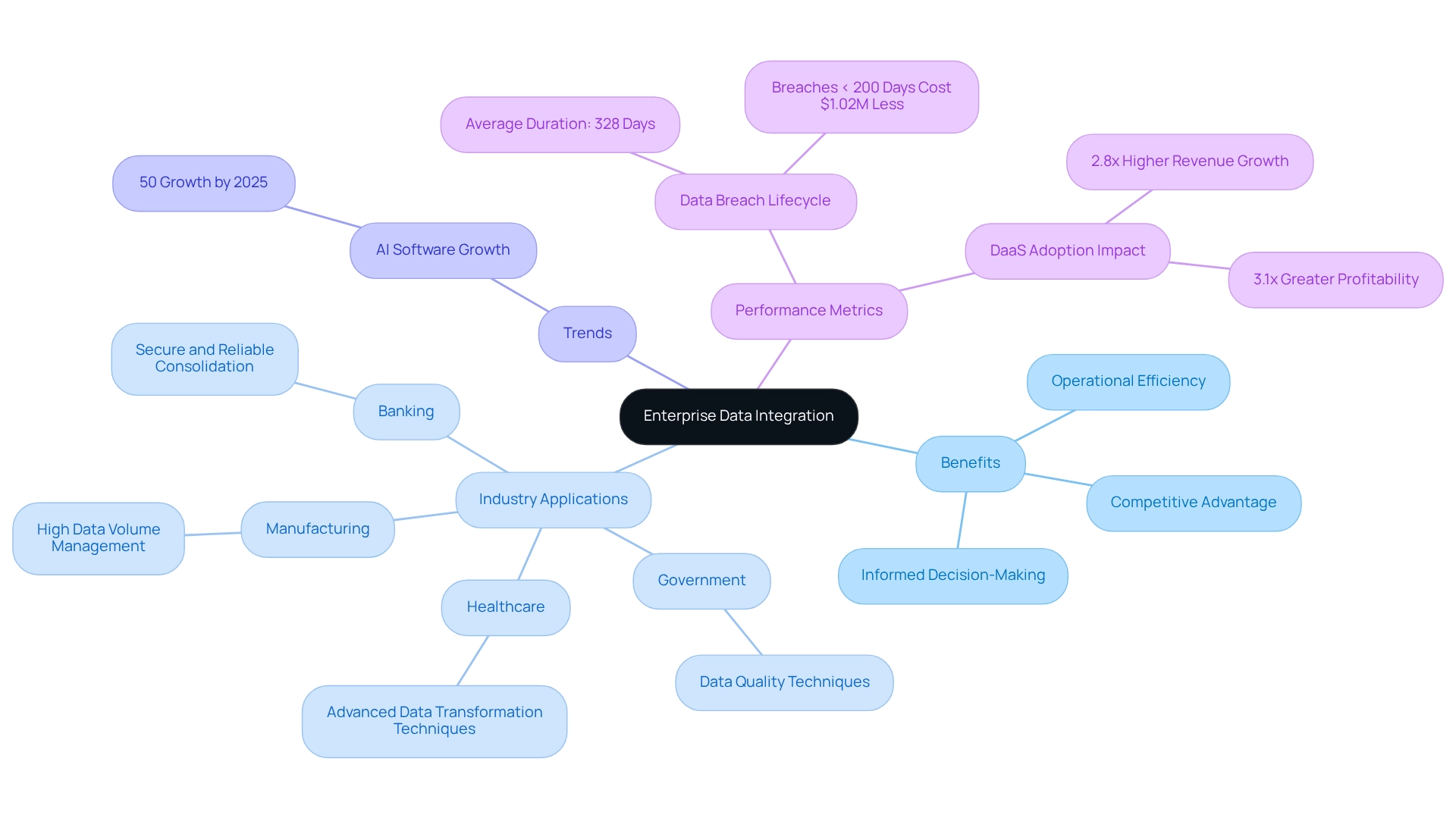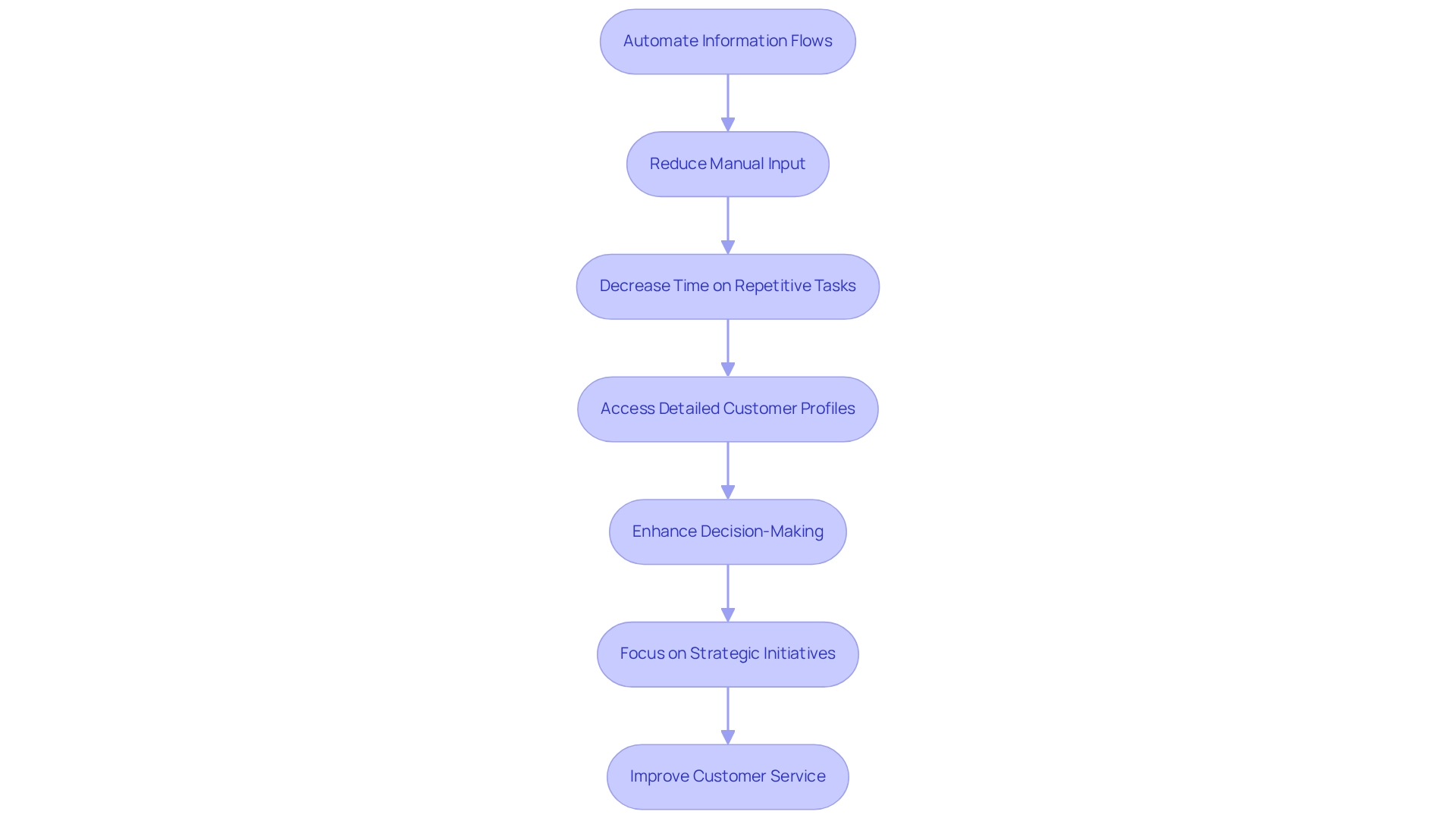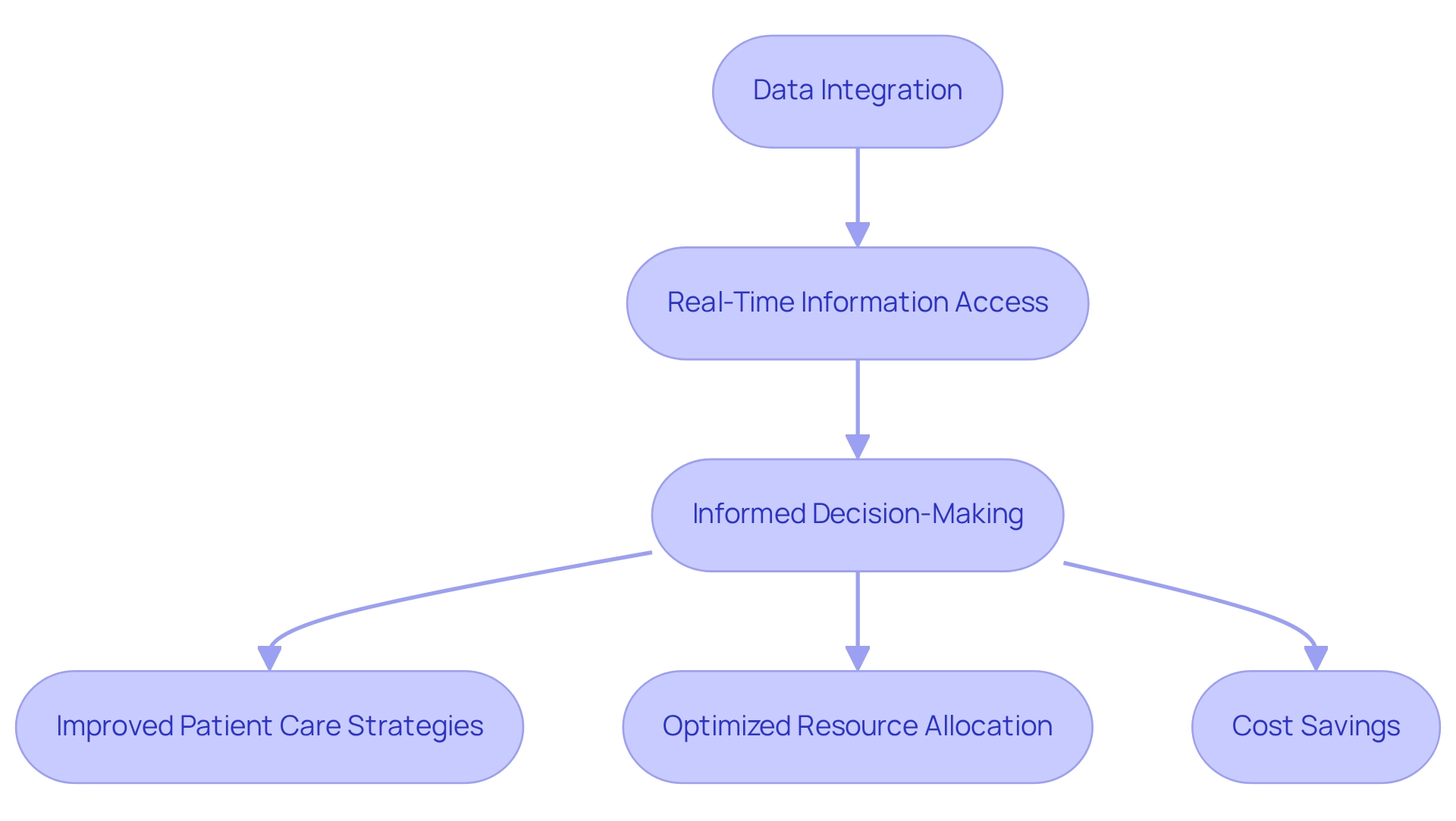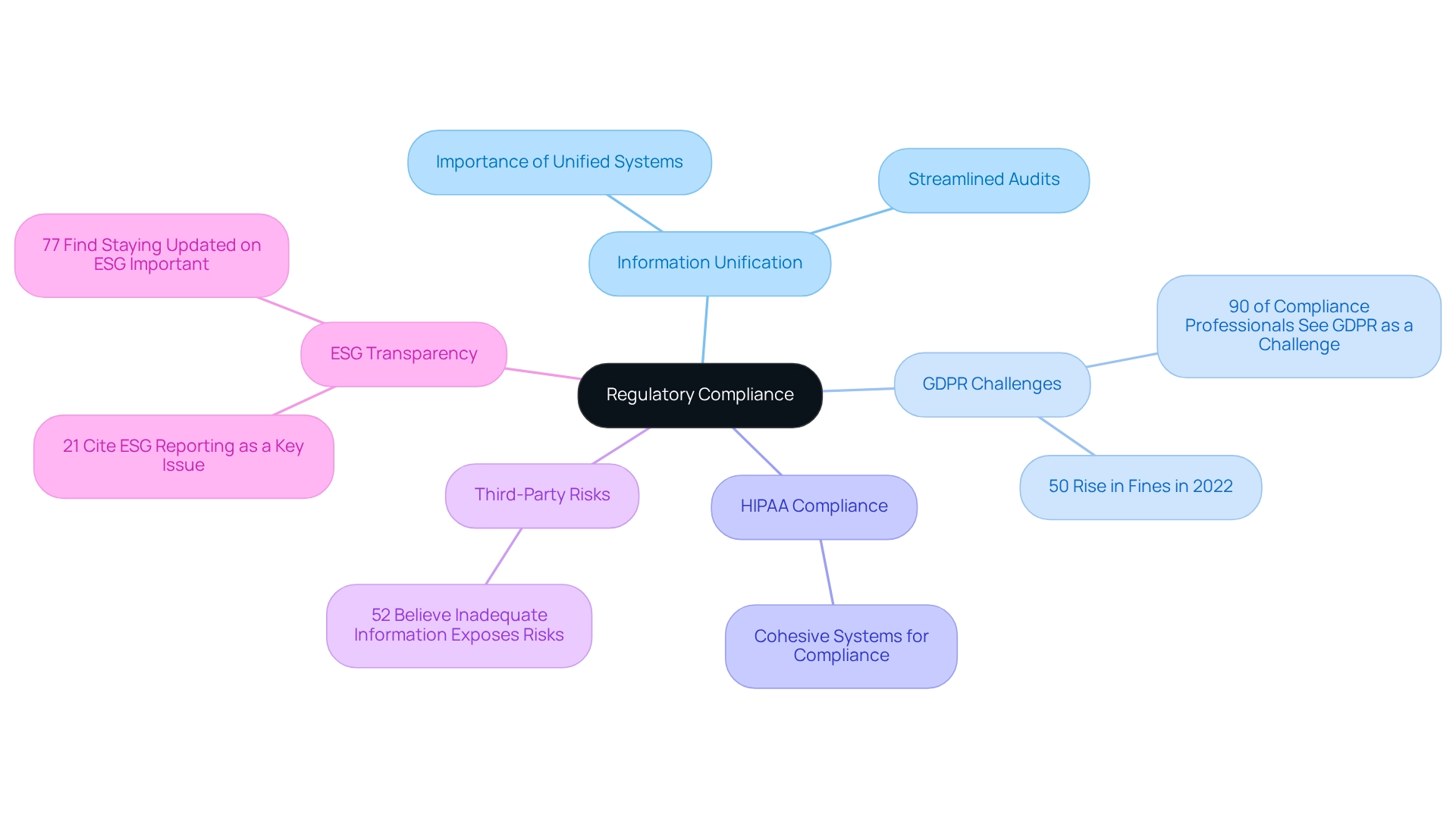Overview
Enterprise data integration offers significant advantages, including enhanced operational efficiency, improved data quality, and superior business decision-making capabilities. How can these benefits transform your organization? Integrated systems streamline processes, reduce errors, and provide real-time insights. As a result, organizations are empowered to respond swiftly to market demands and foster strategic innovation. By embracing data integration, you position your business to thrive in an increasingly competitive landscape.
Introduction
In a world where data is often siloed and fragmented, the demand for seamless enterprise data integration is more pressing than ever. Organizations are increasingly recognizing that consolidating information from diverse sources transcends mere technical necessity; it is a strategic imperative.
By dismantling barriers between systems, businesses can significantly enhance operational efficiency, improve data quality, and drive informed decision-making. As industries evolve to meet the complexities of a digital landscape, solutions like Avato’s hybrid integration platform emerge as essential tools for organizations seeking to unlock the full potential of their data.
This article explores the multifaceted benefits of enterprise data integration, illustrating how it fosters collaboration, ensures compliance, and ultimately positions companies for sustained competitive advantage.
Understanding Enterprise Data Integration
Enterprise information unification represents a strategic imperative for consolidating insights from diverse sources within a company into a cohesive system. This unification is not merely beneficial; it is essential for streamlining operations, enhancing information accuracy, and facilitating informed decision-making. By dismantling information silos, organizations gain a comprehensive view of their operations, which is critical for effective management and strategic planning.
In today’s information-driven landscape, effective unification is vital for sustaining competitiveness and operational efficiency. Avato’s dedicated hybrid connection platform exemplifies this necessity, enabling businesses to enhance and extend the value of their legacy systems while simplifying complex integrations. Current trends indicate that by 2025, half of AI software will outpace the overall software market, underscoring the growing importance of information amalgamation in leveraging advanced technologies.
A study focusing on information amalgamation priorities across various sectors reveals that industries such as manufacturing, government, and healthcare prioritize information integration to meet their unique operational demands. For instance, healthcare institutions require sophisticated information transformation methods, while government agencies stress the importance of information quality. This highlights the critical role of information unification in addressing diverse operational needs across sectors, including banking, where secure and reliable consolidation is paramount.
The platform ensures continuous uptime and reliability, positioning it as an ideal solution for these industries. Moreover, organizations that effectively implement information unification strategies experience significant operational efficiencies. For example, companies leading the charge in Data as a Service (DaaS) adoption report 2.8 times higher revenue growth and 3.1 times greater profitability compared to their industry counterparts lagging in collaboration efforts, as noted by Deloitte.
Avato’s hybrid connection platform accelerates the unification of disparate legacy systems, liberating information and systems within weeks rather than months—an essential factor for maintaining a competitive edge.
The impact of information unification on operational efficiency is further illustrated by the average duration of a breach, which stands at 328 days. Organizations capable of swiftly identifying and addressing breaches—often facilitated by effective information unification—can significantly reduce costs, with breaches lasting less than 200 days costing approximately $1.02 million less.
In conclusion, the benefits of enterprise data integration are manifold: it enhances operational efficiency, supports strategic decision-making, and ultimately cultivates a competitive advantage. As companies navigate the complexities of modern information ecosystems, the importance of robust information unification strategies will continue to grow. Avato’s hybrid unification platform also provides real-time monitoring and alerts on system performance, further amplifying its value proposition.

Time Savings Through Streamlined Processes
One of the most compelling benefits of enterprise information integration is the significant time savings it offers. By automating information flows and removing the necessity for manual input, companies can drastically decrease the hours dedicated to repetitive tasks. For instance, combining customer information from various platforms allows sales teams to swiftly access detailed profiles, promoting quicker decision-making and enhancing customer service.
This streamlined efficiency not only accelerates workflows but also empowers teams to concentrate on strategic initiatives rather than becoming bogged down by administrative duties.
As organizations increasingly embrace enterprise data integration, they are anticipated to experience average time reductions of up to 30% in manual information entry procedures. This statistic underscores the transformative influence of enterprise data integration on operational efficiency, especially as generative AI becomes a pivotal player in financial services. A recent survey revealed that 60% of financial organizations are now leveraging generative AI to enhance enterprise data integration and improve customer experience, particularly through advanced chatbots and virtual assistants. This further illustrates the essential role of unification in modern information management.
Expert insights suggest that automating information flows can lead to remarkable efficiency gains. Ryan Neu, CEO of Vendr, notes, “Yes, it’s a harder sales environment. Yes, prospects expect a deal. Yes, budget compression is real. But, companies still need world-class SaaS to operate their businesses.” IT administrators have indicated that enterprise data integration not only streamlines operations but also enhances information accuracy, thereby reducing the likelihood of mistakes associated with manual entry.
For example, entities such as OSME Pacific and BC Provincial Health Services Authority have effectively adopted Avato’s unification solutions, resulting in considerable time savings and improved project outcomes.
As the SaaS market continues to expand, with Gartner predicting over $208 billion in end-user expenditure in 2023, the need for efficient enterprise data integration solutions is more evident than ever. This trend emphasizes the importance for companies to adopt robust strategies for enterprise data integration to remain competitive and adaptable to market shifts. Furthermore, with 23% of the largest influencers in acquiring ERP software being finance and accounting staff, the significance of cohesive solutions in financial decision-making processes within organizations cannot be overstated.
Avato’s expertise in hybrid unification positions it as a reliable partner for financial institutions aiming to modernize their systems and enhance operational efficiency.

Reduced Errors and Improved Data Quality
Information integration is vital for significantly minimizing mistakes and enhancing quality by ensuring consistency and accuracy across all systems. By consolidating information, organizations can effectively reduce inconsistencies that often arise from manual entry or the use of disparate systems. For instance, a financial institution that integrates its transaction data can guarantee that all departments operate with the same reliable figures, thereby decreasing the likelihood of errors that may lead to compliance issues or financial losses.
The critical nature of precise information is underscored by insights from compliance officers, who emphasize that maintaining high quality is essential for meeting regulatory standards and fostering trust in analytics and reporting. According to Gartner, “Poor information quality costs companies on average $12.9 billion,” highlighting the financial repercussions of inaccuracies.
Moreover, organizations that have implemented integrated information systems have reported notable improvements in quality metrics post-integration. A case study featured in the Harvard Business Review illustrates how errors from manual information entry can result in operational inefficiencies, causing delays and miscommunications. By addressing these challenges through effective enterprise data integration, financial institutions can streamline their operations and boost overall performance.
In this regard, optimizing unification strategies with Avato is paramount. Engaging stakeholders early in the process ensures that requirements are accurately captured, while modeling new business processes can outline a pathway to success. Furthermore, employing XSLT for efficient XML information transformation not only minimizes errors but also enhances the overall unification process.
The application of schemas further eradicates entire classes of programming errors, yielding significant cost savings for businesses.
Statistics Canada highlights the importance of service standards in information management, which resonates with banking IT managers who prioritize reliability and accuracy in their systems. Data indicates that companies leveraging information unification technologies experience a substantial reduction in errors, which improves operational processes and supports strategic decision-making. As we advance further into 2025, the emphasis on enterprise data integration to elevate information quality in financial institutions will intensify, making robust information unification solutions from Avato more critical than ever.
Additionally, understanding the challenges posed by vendor-provided connectivity solutions in connected banking is essential for navigating the complexities of contemporary financial environments.
Enhanced Business Planning and Decision-Making
Enterprise information unification empowers organizations to achieve a coherent perspective of their information, significantly enhancing business planning and decision-making processes. Avato’s Hybrid Integration Platform is pivotal in this endeavor, maximizing and extending the value of legacy systems, simplifying complex integrations, providing real-time monitoring and alerts on system performance, and ensuring 24/7 uptime and reliability. Access to real-time information across various departments allows leaders to make informed decisions that align with their strategic objectives.
Consider the healthcare sector: providers that integrate patient information can effectively evaluate treatment outcome trends, leading to improved patient care strategies and optimized resource allocation. This comprehensive viewpoint not only facilitates swift responses to market changes and operational challenges but also fosters a culture of evidence-based decision-making.
Organizations leveraging enterprise data integration, particularly through Avato’s platform, are witnessing substantial improvements in their decision-making capabilities. Statistics reveal that by 2026, data-driven strategies will surpass instinct-based approaches in 65% of B2B sales organizations. This shift underscores the growing reliance on information for strategic planning and operational efficiency.
Moreover, expert insights indicate that integrated information enhances business planning by providing a clearer understanding of market dynamics and internal performance metrics. Healthcare leaders have noted that real-time information access is crucial for patient care, with many emphasizing its role in timely interventions and improved health outcomes. The platform not only addresses these needs but also contributes to significant cost savings by streamlining processes and eliminating inefficiencies.
Furthermore, advanced analytics utilize both historical and current information to identify risks, foresee market fluctuations, and boost project success rates. However, many organizations face challenges in becoming information-driven, including poor information quality and a reliance on intuition over data. As organizations increasingly adopt integrated information solutions like Avato’s Hybrid Integration Platform, the impact on enterprise data integration, business planning, and decision-making will become increasingly pronounced, driving innovation and competitive advantage in their respective industries.

Improved Team Collaboration and Communication
Enterprise data integration acts as a catalyst for enhanced collaboration and communication among teams by creating a unified source of truth. When all departments access the same information, it effectively eliminates confusion and miscommunication. For instance, when marketing and sales teams share integrated customer information, they can work together more effectively, leading to more focused campaigns and improved customer engagement.
This synergy not only boosts productivity but also fosters innovation, as teams can leverage shared insights to devise new strategies.
Statistics reveal that nearly one-third of employees anticipate that communication with team members and customers will become increasingly challenging in 2023. However, these challenges can be mitigated by enterprise data integration, which streamlines the flow of details across departments. As Gustavo Estrada observed, the company simplifies intricate projects and delivers outcomes within preferred timelines and financial limits, emphasizing the significance of efficient data merging in overcoming communication obstacles.
The hybrid connectivity platform has played a crucial role in transforming legacy systems, particularly in the banking industry. With a proven history of successful implementations, including the seamless transition at Coast Capital with minimal downtime, the company showcases its ability to manage complex systems effectively. Notably, the incorporation at Coast Capital became operational in February 2013, and in June 2016, the company enabled the transition of Coast Capital’s entire telephone banking and contact center telephony system with only a 63-second outage.
This not only accelerates secure system unification but also ensures that financial institutions can adapt to changing requirements without sacrificing reliability.
A study published in the Project Management Journal found that collaborative teams are 33% more likely to complete projects on time, underscoring the critical role of effective communication in project success. This emphasizes the importance of enterprise data integration in a swiftly changing environment, as the company provides a dependable, future-ready technology stack that helps businesses adjust to shifting demands. Furthermore, Avato supports 12 levels of interface maturity, enabling organizations to balance speed of implementation with the sophistication needed to future-proof their technology stack.
Professional perspectives further underscore the importance of enterprise data integration for effective team collaboration. Marketing and sales leaders stress that shared customer information not only improves alignment between their teams but also fosters better decision-making and strategic planning. By enhancing team cooperation through consolidated information, organizations can unlock new levels of efficiency and responsiveness, ultimately leading to a more agile and competitive business environment.
Avato’s expertise in hybrid unification not only lowers expenses but also accelerates product delivery and enhances customer satisfaction, establishing it as an essential ally for financial institutions striving for success. As Tony Leblanc from the Provincial Health Services Authority stated, “Good team. Good people to work with. Extremely professional. Extremely knowledgeable.
Ensured Regulatory Compliance
Enterprise information unification is vital for maintaining regulatory adherence, particularly in heavily regulated sectors like banking and healthcare. Integrated information systems provide organizations with precise and verifiable records, essential for compliance with stringent regulations such as GDPR and HIPAA. By automating information gathering and reporting procedures, companies can significantly mitigate the risk of non-compliance and the associated penalties.
Avato’s expert connection services—including enterprise architecture, solutions architecture, project management, and technical analysis—play a pivotal role in this domain. Collaborating with managed service providers globally, they deliver tailored connection solutions that meet the unique needs of the banking sector. Consider this: a staggering 90% of compliance professionals identify GDPR compliance as one of their most significant challenges, with fines in 2022 soaring 50% higher than the previous year. This statistic underscores the necessity for robust information unification solutions that simplify compliance efforts.
Furthermore, unified systems streamline audits and enhance information tracking capabilities, enabling entities to demonstrate compliance effortlessly when required. Statistics reveal that 52% of compliance specialists believe inadequate information about partners exposes companies to third-party risks, highlighting the critical importance of thorough information unification. Additionally, 21% of risk and compliance professionals cite ESG transparency and reporting as a significant compliance issue, emphasizing the need for integrated systems that can adapt to evolving regulatory landscapes. As Sharavanan noted, 77% of corporate risk and compliance experts deem it essential or highly essential to stay informed about the latest ESG developments, reinforcing the importance of data unification in addressing these challenges.
Organizations that have successfully maintained compliance with GDPR and HIPAA through cohesive systems exemplify the effectiveness of this approach. By leveraging a hybrid platform operating on Red Hat’s JBoss Middleware, alongside expert insights, these organizations not only bolster their compliance stance but also enhance operational efficiency, ultimately positioning themselves for sustained success in a complex regulatory environment. The technology stack is designed to be reliable and future-ready, further aiding businesses in adapting to changing demands and regulatory standards.
Moreover, Avato mobilizes stakeholders to accurately gather requirements and model business processes, ensuring successful integration and reinforcing their commitment to customer-centric solutions.

Valuable Insights for Strategic Innovation
Integrated information through enterprise data integration equips organizations with vital insights that propel strategic innovation. By harnessing comprehensive datasets, businesses can identify trends, comprehend customer preferences, and detect operational inefficiencies. For example, a retail company that merges sales and inventory data can adjust stock levels in real-time according to demand fluctuations, thus minimizing waste and enhancing customer satisfaction.
In 2025, studies indicate that approximately 70% of businesses are leveraging integrated information to foster strategic innovation, derived from a sample size of 485 participants from the Cross Study, underscoring its growing significance in the industry.
Furthermore, organizations that effectively implement enterprise data integration not only enhance operational efficiency but also empower themselves to innovate their products and services. This adaptability is essential for sustaining a competitive advantage in an ever-evolving market landscape. Expert opinions highlight that enterprise data integration is foundational for strategic innovation, enabling businesses to make informed decisions that resonate with market dynamics.
As noted by Gustavo Estrada, a customer, “this solution for its capacity to streamline intricate projects and achieve outcomes within preferred timelines and budget limitations,” leveraging information insights can provide a substantial competitive edge, allowing organizations to stay ahead of the curve and respond proactively to emerging trends.
The survey identifies generative AI as the second-most-utilized AI workload in financial services, marking a pivotal shift in how institutions approach problem-solving and innovation. The company enhances enterprise data integration by unifying isolated systems and fragmented data, creating the connected foundation that enterprises need to simplify, standardize, and modernize. Designed for secure transactions, this platform is trusted by banks, healthcare, and government sectors.
With support for 12 levels of interface maturity, Avato empowers organizations to balance the speed of integration with the sophistication necessary to future-proof their technology stack. Moreover, the 60% increase in the utilization of generative AI for customer experience, particularly in developing advanced chatbots and virtual assistants, illustrates how combined analysis can yield significant insights, emphasizing the strength of information unification in achieving valuable results. Additionally, the innovative techniques introduced in the package named MetaGIM, available on GitHub, showcase creative strategies in information unification that align with the target audience’s interest in efficient information management solutions.
Competitive Advantage Through Enhanced Efficiency
Enterprise data integration stands as a cornerstone in enhancing operational efficiency, granting companies a significant competitive edge. By optimizing procedures, minimizing errors, and improving information quality, organizations can operate more effectively and swiftly respond to market demands. This heightened efficiency not only leads to reduced operational costs but also empowers companies to allocate resources more strategically, fostering an environment conducive to growth and innovation.
In 2025, firms adopting data-centric strategies are projected to witness an average market share increase of approximately 15%. This statistic underscores the importance of integrated information systems in achieving a competitive advantage. Furthermore, the typical Continuous Integration (CI) team, consisting of 3-5 members, supports around 500 users, illustrating the scalability and efficiency enhancements that AI-driven platforms can deliver.
Case studies reveal that organizations leveraging enterprise data integration have successfully decreased operational expenses while enhancing their agility. For instance, a recent study highlighted the connection between organizational flexibility and data-driven innovation capabilities, concluding that this integration significantly boosts marketing agility—an essential factor in adapting to rapid market shifts. This aligns with the company’s dedication to simplifying complex projects and enhancing business value, as noted by client Gustavo Estrada, who praised the firm for its ability to deliver results within desired timelines and budget constraints.
The organization, whose name translates from Hungarian to ‘of dedication,’ ensures continuous uptime for critical links, reinforcing the reliability aspect of its solutions—crucial for the banking industry’s target audience. The hybrid platform offered by the company is specifically designed to address the unique challenges faced by banking institutions, facilitating seamless integration of legacy systems with modern applications. Expert insights further validate that the efficiency gained from Avato’s hybrid integration platform not only streamlines operations but also positions organizations advantageously against competitors.
As businesses navigate the complexities of today’s landscape, the capacity to harness enterprise data integration becomes increasingly essential for maintaining a competitive edge.
Conclusion
In today’s landscape, data integration transcends mere technical necessity; it stands as a strategic imperative. Organizations must acknowledge the multifaceted benefits it provides. By consolidating data from varied sources, businesses streamline operations, enhance data quality, and drive informed decision-making, ultimately securing a competitive edge. The insights shared throughout this article demonstrate how effective enterprise data integration fosters collaboration, improves compliance, and positions organizations for sustained success in an ever-evolving digital environment.
The advantages of robust data integration strategies, exemplified by Avato’s hybrid integration platform, are unmistakable. From substantial time savings and reduced errors to improved business planning and decision-making, integrated data empowers organizations to operate efficiently and respond rapidly to market shifts. Moreover, the capacity to generate valuable insights for strategic innovation ensures that businesses can adapt and thrive in an increasingly competitive landscape.
As industries continue to evolve and confront new challenges, the significance of enterprise data integration will only amplify. Organizations that prioritize data integration not only enhance their operational efficiency but also unlock new avenues for innovation and growth. In this dynamic environment, leveraging integrated data systems is essential for achieving long-term success and maintaining a competitive advantage. Embracing these strategies will enable organizations to navigate complexities, foster collaboration, and ultimately drive future growth.

